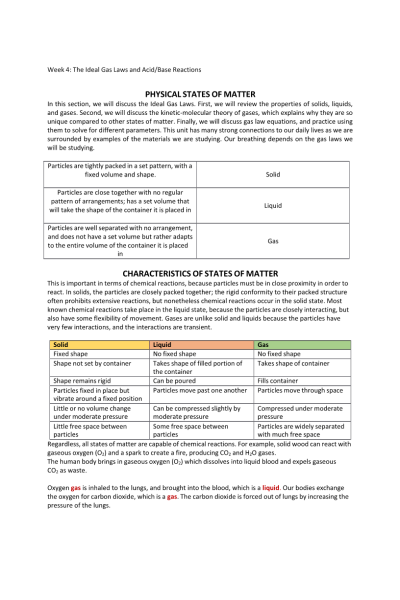CHEM 120 Week 4 Concepts; The Ideal Gas Laws and Acid-Base Reactions
-
$25.00
| Institution | Chamberlain |
| Contributor | Karin Austin |
Document Preview
PHYSICAL STATES OF MATTER
In this section, we will discuss the Ideal Gas Laws. First, we will review the properties of solids, liquids, and gases. Second, we will discuss the kinetic-molecular theory of gases, which explains why they are so unique compared to other states of matter. Finally, we will discuss gas law equations, and practice using them to solve for different parameters. This unit has many strong connections to our daily lives as we are surrounded by examples of the materials we are studying. Our breathing depends on the gas laws we will be studying.
Particles are tightly packed in a set pattern, with a fixed volume and shape. |
Solid |
Particles are close together with no regular pattern of arrangements; has a set volume that will take the shape of the container it is placed in |
Liquid |
Particles are well separated with no arrangement, and does not have a set volume but rather adapts to the entire volume of the container it is placed in |
Gas |
CHARACTERISTICS OF STATES OF MATTER
This is important in terms of chemical reactions, because particles must be in close proximity in order to react. In solids, the particles are closely packed together; the rigid conformity to their packed structure often prohibits extensive reactions, but nonetheless chemical reactions occur in the solid state. Most known chemical reactions take place in the liquid state, because the particles are closely interacting, but also have some flexibility of movement. Gases are unlike solid and liquids because the particles have very few interactions, and the interactions are transient……….. Continue
| Instituition / Term | |
| Term | Summer |
| Institution | Chamberlain |
| Contributor | Karin Austin |





-80x80.JPG)



-80x80.JPG)





























































